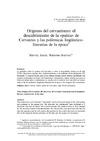Identificador persistente para citar o vincular este elemento:
https://accedacris.ulpgc.es/jspui/handle/10553/71011
| Título: | Orígenes del cervantismo: El descubrimiento de la «patria» de Cervantes y las polémicas lingüístico-literarias de la época | Otros títulos: | Origins of cervantism: The discovery of Cervantes' homeland and the linguistic-literary controversies of the time | Autores/as: | Perdomo Batista, Miguel Angel | Clasificación UNESCO: | 570107 Lengua y literatura | Palabras clave: | Siglo XVIII Polémicas Patria de Cervantes Juan De Iriarte 18th Century, et al. |
Fecha de publicación: | 2019 | Publicación seriada: | Anales Cervantinos | Resumen: | La polémica sobre la «patria» de Cervantes y sobre su descubridor arranca en el siglo XVIII y llega hasta nuestros días. Tradicionalmente, se ha atribuido el descubrimiento al P. Sarmiento y a Juan de Iriarte, pero en las últimas décadas parece haberse modificado esta opinión en beneficio exclusivo del benedictino. Aportaremos alguna prueba que pone en duda esta última idea y analizaremos la cuestión en el contexto en el que debe ser examinada, el de las polémicas lingüístico-literarias de la época y los orígenes del cervantismo. The controversy over Cervantes’ “homeland” and its discoverer began in the 18th century and continues to the present day. The discovery has traditionally been attributed to P. Sarmiento and Juan de Iriarte, but in recent decades this opinion seems to have changed for the exclusive benefit of the Benedictine. We will provide some proof that calls this last idea into question and we will analyse the question in the context that must be examined, that of the linguistic-literary polemics of the time and the origins of Cervantism. |
URI: | https://accedacris.ulpgc.es/handle/10553/71011 | ISSN: | 0569-9878 | DOI: | 10.3989/anacervantinos.2019.012 | Fuente: | Anales Cervantinos [ISSN 0569-9878],v. 51, p. 251-276, (2019) |
| Colección: | Artículos |
Citas SCOPUSTM
2
actualizado el 08-jun-2025
Citas de WEB OF SCIENCETM
Citations
1
actualizado el 22-feb-2026
Visitas 5
310
actualizado el 15-ene-2026
Descargas
158
actualizado el 15-ene-2026
Google ScholarTM
Verifica
Altmetric
Comparte
Exporta metadatos
Los elementos en ULPGC accedaCRIS están protegidos por derechos de autor con todos los derechos reservados, a menos que se indique lo contrario.
